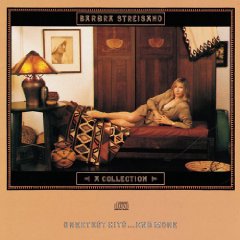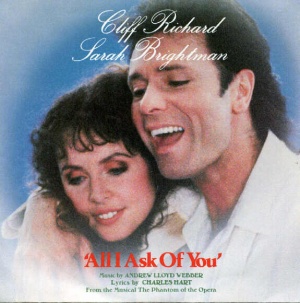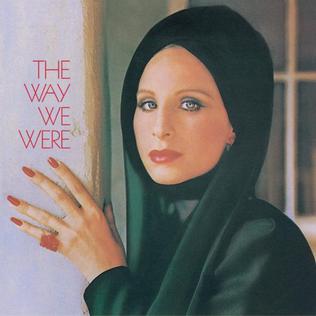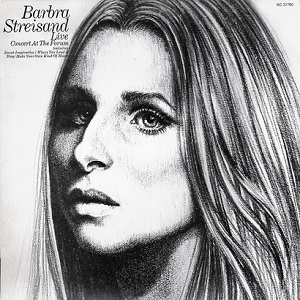
"The Way We Were" is a song by American singer Barbra Streisand from her fifteenth studio album of the same name. It was released as the album's lead single on September 27, 1973, through Columbia Records. The 7" single was distributed in two different formats, with the standard edition featuring B-side track "What Are You Doing the Rest of Your Life?"; the Mexico release instead included an instrumental B-side. The song was written by Alan Bergman, Marilyn Bergman, and Marvin Hamlisch, while production was solely handled by Marty Paich. "The Way We Were" was specifically produced for the record, in addition to three other tracks, including her then-upcoming single "All in Love Is Fair" (1974).

The Movie Album is the thirtieth studio album by American singer Barbra Streisand, released on October 14, 2003, by Columbia Records. Overall, her sixtieth release with her record label, it was executively produced by Streisand and her manager, Jay Landers. A concept album, it contains twelve songs from the singer's favorite films ranging in release from 1935 to 1988. While curating the album, Streisand was inspired by her marriage to actor James Brolin to record songs about love and relationships. To better fit her needs, songwriting duo Alan and Marilyn Bergman were commissioned to add lyrics to several of the songs Streisand had chosen to record.

A Collection: Greatest Hits...and More is the fourth greatest hits album recorded by American vocalist Barbra Streisand. It was released on October 3, 1989 by Columbia Records. The compilation features ten songs from Streisand's career, dating from 1975 to 1988, plus two previously unreleased songs: "We're Not Makin' Love Anymore" was released as the album's lead single on September 14, 1989, and "Someone That I Used to Love" was distributed as the second and final one in 1989. Both singles charted on several record charts internationally.

"All I Ask of You" is a song from the 1986 English musical The Phantom of the Opera, between characters Christine Daaé and Raoul, originally played on stage by Sarah Brightman and Steve Barton, respectively. It was written by Andrew Lloyd Webber, Charles Hart and Richard Stilgoe, and solely produced by Lloyd Webber. An operatic pop piece, its lyrics serve as dialogue between the two characters and discuss themes such as commitment and romance. Like Lloyd Webber's song "The Music of the Night", "All I Ask of You" was compared to the music found in Giacomo Puccini's 1910 opera La fanciulla del West.

The Way We Were is the fifteenth studio album recorded by American singer Barbra Streisand. The album was released in January 1974, preceded by the commercial success of its lead single "The Way We Were" first released in September 1973.

A Love Like Ours is the twenty-eighth studio album by American singer Barbra Streisand. It was released in North America on September 21, 1999, and Europe on September 20, 1999. It is her 23rd Top 10 album in the US. This was Streisand's first commercial release since her marriage to actor James Brolin. Much of the material was inspired by this event. As such, the disc booklet contains images of her and Brolin.

Lazy Afternoon is the seventeenth studio album recorded by American singer Barbra Streisand. It was released on October 14, 1975, by Columbia Records. Following a mixed critical response to her previous studio album, ButterFly (1974), the singer began working with new musicians for the project. Recorded in April 1975 in Los Angeles, Lazy Afternoon contains pop standards. Producer Rupert Holmes wrote three songs on the album and co-wrote a fourth, "By the Way", with Streisand. She also included a few cover songs, such as Four Tops' "Shake Me, Wake Me ", Stevie Wonder's "You and I", and Libby Holman's "Moanin' Low".

Live Concert at the Forum is the second live album by American singer Barbra Streisand, released physically on October 1, 1972, by Columbia Records. Produced by long-time collaborator Richard Perry, it was recorded at The Forum in Inglewood, part of Greater Los Angeles, on April 15, 1972, during Four for McGovern, a concert held in benefit for George McGovern's 1972 presidential campaign. A CD version of Live Concert at the Forum was released on September 6, 1989.

ButterFly is the sixteenth studio album by American singer Barbra Streisand. Released on October 1, 1974, by Columbia Records, it marked Streisand's first album of entirely new material in over three years. Primarily a contemporary pop record recorded throughout 1974, it also incorporates music from the reggae and R&B genres. All of the tracks on ButterFly are cover songs produced by Streisand's then-boyfriend Jon Peters, originating from artists like Bob Marley, David Bowie, Evie Sands, and Graham Nash.

Barbra Streisand...and Other Musical Instruments is the fourteenth studio album by American singer Barbra Streisand. It was released on November 2, 1973, by Columbia Records. The album was made available following a 1973 live television special promoted to improve Streisand's image and sound. With world music as the primary genre, the album's instrumentation varies greatly; even items such as kitchen utensils were used to create melodies and beats. With a majority of the songs on the album being cover songs, Streisand also re-recorded various tracks that originated earlier in her career. Her manager, Martin Erlichman, was credited as the album's sole and executive producer.

"Didn't We" is a song recorded by Irish singer and actor Richard Harris for his debut studio album, A Tramp Shining (1968). It was written and produced by Jimmy Webb and originally served as the B-side to Harris' 1968 single "MacArthur Park". "Didn't We" was then distributed as the record's single by Dunhill Records, also in 1968. A traditional pop song, Harris sings about his life in the past. Commercially, it charted at lower positions of both the United States and Canada, and in the higher ranks of their Adult Contemporary component charts. Harris featured "Didn't We" on several of his greatest hits albums, including The Richard Harris Collection: His Greatest Performances from 1973. That same year, the song was reissued as a promotional single paired alongside his 1971 single "My Boy".

On a Clear Day You Can See Forever is the soundtrack album to the 1970 American film of the same name. It was released by Columbia Records on July 1, 1970 and features singing by Barbra Streisand and Yves Montand, in addition to choral arrangements and live orchestration. No commercial singles were released from the soundtrack, but the reprise version of the title track was released as a promotional single on 7" vinyl by Columbia. Executively and solely produced by Wally Gold, the album's ten tracks were written by Alan Jay Lerner while the music was written by Burton Lane. The album was reissued on compact disc in 2008.

"All in Love Is Fair" is a song by American singer-songwriter Stevie Wonder recorded for his sixteenth studio album, Innervisions (1973). Written and produced by Wonder, it was released as a 7" single in Brazil in 1974. The song is a pop ballad with lyrics that describe the end of a relationship through the use of clichés. Critical reaction to the song has been varied: Matthew Greenwald of AllMusic wrote that it was among Wonder's "finest ballad statements", but Robert Christgau felt that the singer's performance was "immature". Wonder has included it on several of his greatest hits albums, including the most recent, 2005's The Complete Stevie Wonder.

"We're Not Makin' Love Anymore" is a song recorded by American singer Barbra Streisand for her fourth greatest hits album, A Collection: Greatest Hits...and More (1989). It was released on September 14, 1989 by Columbia Records on 7-inch, 12-inch, cassette, and CD. It was written by Michael Bolton and Diane Warren and produced by Narada Michael Walden. Bolton's inspiration for the song was derived from his divorce; he and Warren debated what singer would be able to sing their work well and ultimately decided that Streisand would be the right fit. The song is a ballad that is similar in sound to Streisand's "Comin' In and Out of Your Life" (1981).

"I Won't Be the One to Let Go" is a song recorded by American singers Barbra Streisand and Barry Manilow for the former's sixth compilation album, Duets (2002). It was released as the album's only single on November 4, 2002, by Columbia Records. The track was written and produced by Richard Marx with additional songwriting coming from Manilow and additional production handled by Walter Afanasieff. Initially an airplay and streaming-only single in the United States, a promotional CD single of "I Won't Be the One to Let Go" was released and includes the radio edit and album version of the song.

"Stranger in a Strange Land" is a song recorded by American singer Barbra Streisand for her 31st studio album, Guilty Pleasures (2005). It was released as the album's lead single on August 16, 2005, by Columbia Records. The track was written by Ashley Gibb, Barry Gibb and Stephen Gibb while production was handled by Barry Gibb and John Merchant. It serves as the first of 11 reunion collaborations with Barry Gibb, who Streisand had last collaborated with on Guilty (1980). The single was released digitally and physically distributed on CD and DVD, with some editions including the song's official music video.

"Night of My Life" is a song recorded by American singer Barbra Streisand for her 31st studio album, Guilty Pleasures (2005). It was released as the album's second single on September 27, 2005, by Columbia Records. The track was written by Ashley Gibb and Barry Gibb while production was handled by Barry Gibb and John Merchant. It serves as one of Streisand's first of 11 reunion collaborations with Barry Gibb since their work on her album Guilty in 1980. It was released digitally and on 12" and CD in five different formats, each including various remixes of the single.

Funny Lady is the soundtrack album of the 1975 musical film of the same title, starring Barbra Streisand. Released by Arista Records on March 15, 1975, arranged, conducted, and coordinated by Peter Matz, the album's fifteen tracks are performed by Streisand, James Caan, and Ben Vereen. A sequel to the 1968 musical comedy-drama Funny Girl, the songs extend the semi-biographical account of the life of American performer Fanny Brice. Funny Lady also included songs written by Brice's third husband Billy Rose. New music by Kander and Ebb included "How Lucky Can You Get", the album's only single, released in April 1975.

Nuts is the soundtrack album to the 1987 American film of the same name. It was released by Columbia Records on December 21, 1987, and features five instrumental compositions by American singer Barbra Streisand. Nuts is the singer's first release since her live album One Voice, earlier in 1987, and her first soundtrack since Yentl (1983). She insisted on creating the film's score after acquiring the movie through her production company, Barwood Films.

"On a Clear Day (You Can See Forever)" is a song written by Burton Lane (music) and Alan Jay Lerner (lyrics) for the 1965 Broadway musical On a Clear Day You Can See Forever. It was subsequently performed by American actress and vocalist Barbra Streisand in the 1970 film adaptation of the musical.




















